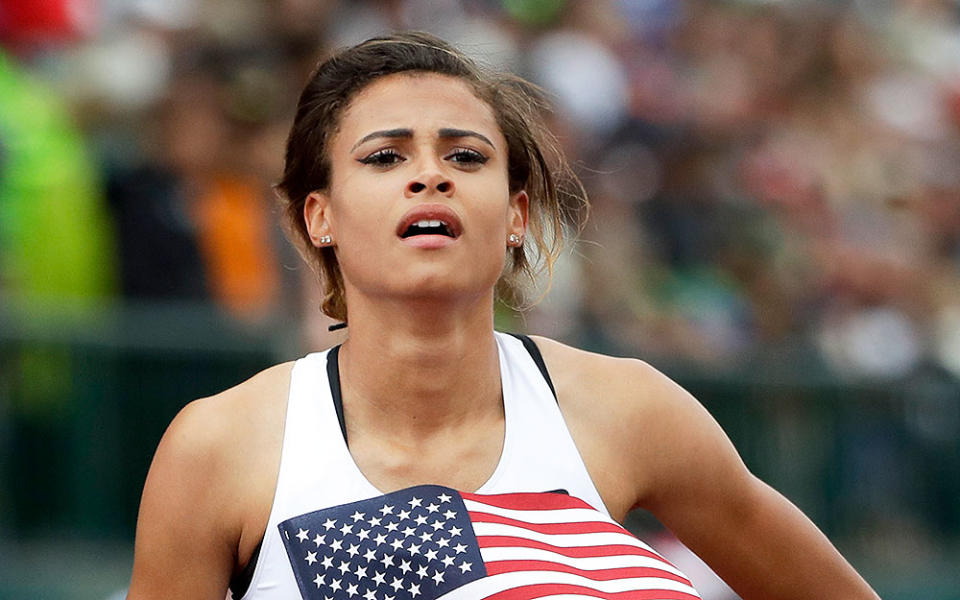How a 16-year-old juggler qualified for the Olympics as America's newest track star

EUGENE, Ore. – The future of American track can juggle while riding a unicycle and craves cheeseburgers and still can’t drive a car and is going to be smiling on a Wheaties box some day in the not-too-distant future. And when Sydney McLaughlin is there, a gold medal hanging around her neck, the United States acutely aware of who she is even as her sport lingers in the periphery only to jump front and center every four years, she’ll think back to Sunday, back to this week at the U.S. Olympic track trials, and remember it as a seminal moment in her career.
Which, considering McLaughlin is all of 16 years old, would seem a bit of a stretch. It’s where she realized she belonged, though, where she shredded the doubts and chucked the fears and became the second-youngest person to make a U.S. Olympic track-and-field team, qualifying in the 400-meter hurdles with a third-place finish Sunday afternoon at Hayward Field.
Earlier this past week, McLaughlin didn’t even want to compete. “I had a nervous breakdown,” she said. Panic hit and paralyzed her. She kept telling Mike McCabe, her coach at Union Catholic High in Scotch Plains, N.J., that she couldn’t do it. She called her brother Taylor, a track star at the University of Michigan, and said: “I’m not gonna run today.” Then she called again and said the same. And again.
And much as the people around McLaughlin wanted to placate her, to tell her everything would be fine, they didn’t soft-pedal. You are running, they told her. You do belong here, they reminded her. You will do this, they urged her.
“That’s what I forgot,” McLaughlin said. “It’s a big meet with a lot of cameras, a lot of people, and sometimes I just forget I’m 16 and there are not as much expectations. I don’t get paid for this. I’m here just for fun.”
Once McLaughlin calmed herself, all of this became as whimsical as the sparkling silver nail polish adorning her fingers. McLaughlin won her first-round heat with the second-fastest time, then a day later did the same in the semifinals, and come Sunday’s race, McCabe said, she was calmer than she’d been all week. Not a monk in prayer or anything, but let’s allow a sliding scale for a 16-year-old, shall we?
On the track, as the eight finalists’ names were called, McLaughlin was whispering to herself, fussing with her hair, slapping her thighs and calves and arms, in her own world. She’d competed in something of a bubble her whole career. Ever since she was 6 and won a race because her dad promised her a chocolate bar with almonds for doing so, McLaughlin was not just faster than everyone but light years beyond.
“Honestly, people seem surprised because she’s just 16,” Taylor said. “They shouldn’t be. She can do whatever she wants to do in this sport.”
While McLaughlin will spread her talents to other events in coming years, the 400 hurdles presented the best opportunity to unseat 18-year-old Vashti Cunningham, the daughter of former NFL quarterback Randall Cunningham, as Team USA’s youngest representative, and join a team with two men, distance runners Bernard Lagat and Meb Keflezighi, who at 41 could be her father.
It didn’t start well. McLaughlin was the slowest off the blocks of the eight, and though that difference amounts to fractions of a second, those fractions spell the difference between elite and Olympian.
Then her legs started to move, and McLaughlin crossed the line in 54.15 seconds, a new high school record and about three-tenths of a second ahead of 24-year-old Kori Carter. “She’s a beast,” Carter said. “She’s the truth. I was in every single heat with her, and she carries herself like a pro.”
Well, she still has the motivation of an amateur at least.
“My mind,” McLaughlin said, “was on finishing this race and going and eating a cheeseburger.”
The sense of humor, the photogenic smile, the unimpeachable talent – the Wheaties-box prophecy isn’t some sort of Olympic hype. Most inside the track community see McLaughlin as the heir to Allyson Felix, herself a onetime prodigy whose trophy case includes four Olympic gold medals and two more silvers. Felix has cottoned to McLaughlin, acutely aware that track and field needs recognizable faces if it hopes to grow without the benevolence of Nike propping it up financially.
So when McLaughlin can stand next to Dalilah Muhammad and Ashley Spencer, the top two finishers in the 400 hurdles, and not just hold her own but push them, and then charm a room without showing any of those nerves or anxiety that almost torpedoed her week – that’s when it’s obvious: This is a star.
Surely NBC is dispatching a crew to Jersey over the next few weeks to grab video of McLaughlin riding the unicycle she and Taylor share up and down the street while juggling three balls. She learned to juggle from her fifth-grade teacher. She mastered the unicycle almost immediately. “She’s a pretty great juggler,” said McCabe, who also is the moderator for the juggling club McLaughlin started at Union Catholic. If this whole track thing doesn’t work out, the Ringling Bros. may have a spot for her.
This whole track thing, though – it’s not much of a concern. Sydney McLaughlin is going to Rio, and even if she can’t grab a medal this year, plenty more await. It took her some time and some tears, but McLaughlin finally knows the truth. She belongs more than she ever could’ve realized.


